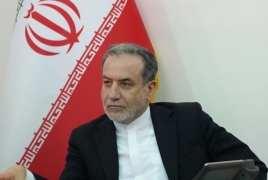Tehran rejects diplomacy while under fire June 20, 2025 - 15:07 AMT PanARMENIAN.Net - Tehran has made it clear that it will not return to diplomatic engagement while "guns are firing." As Israeli airstrikes continue on Iranian territory, the Islamic Republic has rejected U.S. proposals to start talks. Iranian Foreign Minister Abbas Araghchi confirmed that Tehran’s official stance is to reject all diplomatic engagement while Israeli aggression continues. His statement came in response to repeated U.S. messages seeking dialogue. "In the current situation, as long as the attacks by the Zionist regime on Iran continue, we do not want negotiations with anyone... The Americans want to, they have sent messages several times—serious messages—but we clearly told them that as long as the aggression is not stopped, there can be no talk of dialogue and diplomacy," said Araghchi. Meanwhile, the diplomat had earlier confirmed Tehran’s readiness to meet with the foreign ministers of the UK, France, and Germany, with talks scheduled for June 20 in Geneva. According to Reuters, Araghchi had previously held unofficial discussions with U.S. envoy Steve Witkoff. Commenting on Iran’s stance, Farhad Ibrahimov, political analyst and lecturer at RUDN University, told “Vestnik Kavkaza” that Tehran’s decision reflects internal divisions. “We see how Iran wavers between two options—seeking diplomatic solutions to the situation or refusing all negotiations until the military conflict ends. These fluctuations are tied to contradictions within the Iranian elite. Security officials and clergy oppose any negotiation process because the Americans have taken Israel’s side, and therefore talking to the U.S. is now fundamentally unacceptable. Diplomats and the Iranian government take a more pragmatic view and want to resume the negotiation track. That’s why one day Foreign Minister Abbas Araghchi talks about Tehran’s willingness for negotiations, and the next day—about their impossibility,” he said. According to Ibrahimov, both sides of the debate have valid reasoning. “The difficulty of these contradictions is that both approaches have their own logic. On one hand, how can you negotiate with those who are carrying out aggression against you? On the other hand, some space for diplomatic maneuver must be preserved to prevent the current military conflict from turning into a full-scale war. There is still hope that the conflict will not expand beyond its current scale. These hopes are reinforced by President Donald Trump’s statement that he has postponed the Iranian issue for two weeks. Authorities are also observing how society reacts to both options,” he continued. He also highlighted the role of the Iranian parliament. “We must not forget the role of the parliament, which carries significant weight in Iran’s political hierarchy. There is no unity there either: Majlis Speaker Mohammad Bagher Ghalibaf, a staunch conservative, opposes negotiations with the U.S., but some MPs, who wield influence among the clergy, security forces, and government, support resuming dialogue with the Americans. In any case, organizing talks now, while missile attacks from Israel continue, will be extremely difficult. Those strikes must stop for successful diplomatic meetings to happen. There is an expectation that the U.S. could pressure Israel to halt hostilities—if that happens, Iran will 99% sit at the negotiating table and provide guarantees on the nuclear program that Donald Trump seeks,” the orientalist noted. Azerbaijani authorities report that they have already resettled 3,000 people in the Nagorno-Karabakh town of Stepanakert. On June 10, Azerbaijani President of Azerbaijan Ilham Aliyev will leave for Turkey on a working visit. Azerbaijani President Ilham Aliyev arrived in Moscow on April 22 to hold talks with Russian counterpart Vladimir Putin. Authorities said a total of 192 Azerbaijani troops were killed and 511 were wounded during Azerbaijan’s offensive. Partner news |